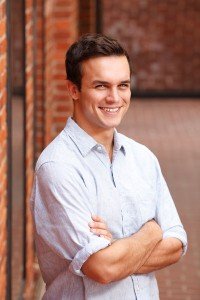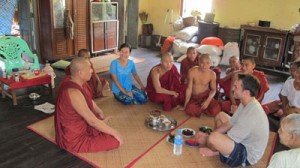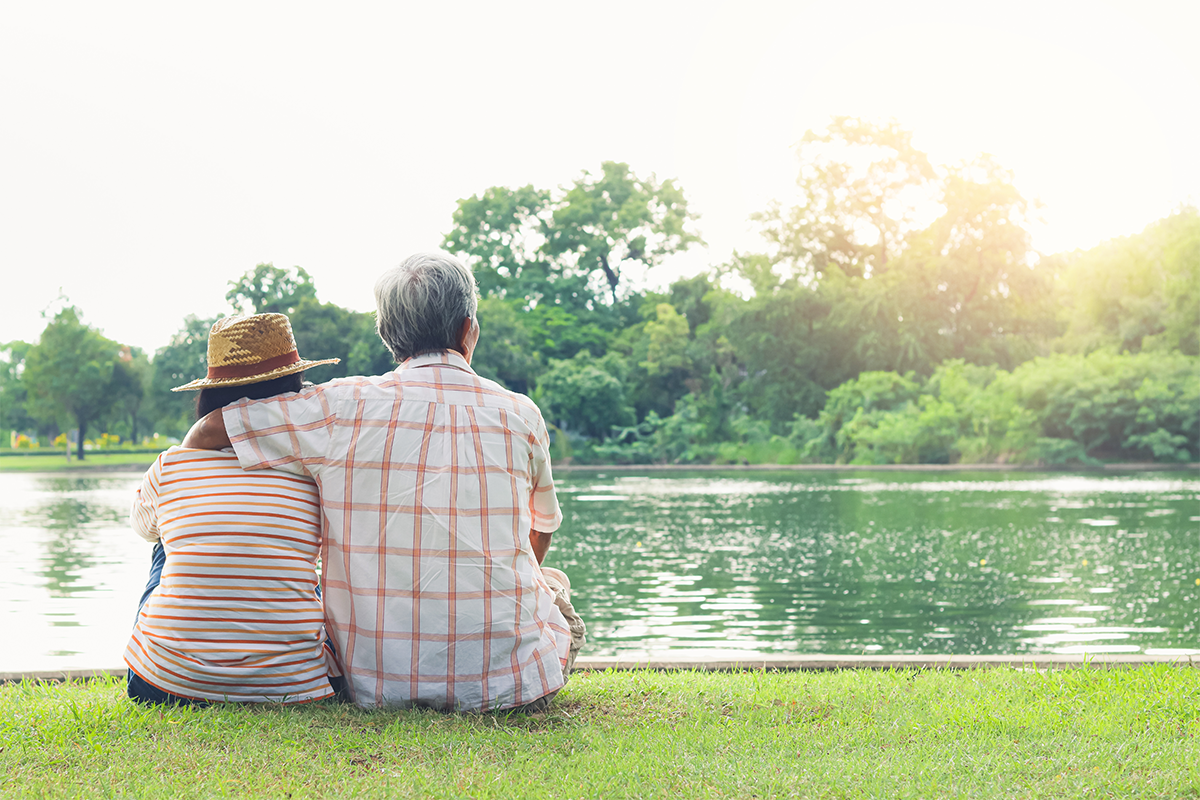A simple, walkable path turned into an unchartered, illegal journey for one college student looking to bring education to others.
By Peter M. Slavin

Last fall, Kirk Acevedo set out to do what no Westerner may have ever done, except in wartime—walk hundreds of miles through Burma. Just months after graduating from American University, Acevedo, then 22, started walking the 400 miles from Rangoon (Yangon) to Mandalay alone. He wanted to go off the tourist track and see the real Burma. He wore the sari-like Burmese longyi, grasped a long staff, and shouldered a backpack. His older brother, a veteran of the Iraq and Afghan wars, had helped him carefully select the contents. They kept the weight to 47 pounds for the estimated four-week trek.
Acevedo had plenty of stamina. He’d been a standout wrestler at Chantilly High School. But in the end the backpack would prove too large, blistering his back.
He spoke little Burmese but carried index cards bearing written questions like “Is there somewhere around her I could spend the night?” and “Do you know somewhere I could eat.” He also had a letter he had written to introduce himself to people. He got the idea from Rory Stewart’s book “The Places in Between” about walking across Afghanistan. The letter explained that he was a college student traveling on foot to Mandalay, adding he was depending on residents’ help and hospitality.
Acevedo set out along Highway One—a two-lane dirt track—carrying little cash and not knowing where he’d stay or eat. As his friend Ryker Labbee put it, Acevedo was “willing to walk across country with nothing to get him out of a jam beyond his wits and a smile.” But what might have seemed naiveté was actually a quiet, prenatural self-confidence. Not that he was without fear. He imagined waking up in his sleeping bag, a python curled alongside. Yet he could laugh at his fears.
Acevedo set out before the recent liberalization measures in Burma (now Myanmar). It was still a police state. There were approved areas for foreign travelers and there were black areas (off-limits, usually due to armed conflicts between the government and ethnic minorities). He figured he could travel Highway One, since it did not go through a black area. He was wrong. Foreigners are barred from going anywhere but tourist sites. Only, says Acevedo, they’re not told that. Since he ran into no one who had tried to go off the beaten track, he was to learn the rules the hard way.
He was very much in the dark about what lay in store along the Rangoon-to-Mandalay route. He could find little about it in writing. Though it passed through villages, towns and cities, in between he expected wilderness.
The Impact of an Expatriate Community
Burma had intrigued him since his sophomore year at American University, when he had joined a student trip to the large expatriate community on the Thai border, largely Burmese who had fled the military regime. Anticipating an exotic Thaivacation, he was shocked by what he learned. “I couldn’t believe the living conditions and stories I heard from the migrants and refugees.”
On return, he threw himself into the cause of democracy for Burma. He and three AU friends brought to campus four Buddhist monks in upstate New York, asylum seekers who played a role in the 2009 Saffron Revolution. The students also flew in from San Francisco the one interpreter the monks trusted. When the monks spoke, it was standing-room only. The monks stayed for three days, sleeping in a Buddhist monastery in Silver Spring. Two returned later and Acevedo escorted them to a private meeting with the House Foreign Affairs Committee. By then, he was interning for the U.S. Campaign for Burma, an anti-regime group. He also managed to make Burma the unofficial focus of his studies until he graduated. Now he wanted to see the country for himself.
He had a cause too. He was walking to raise money so that Ying Kwan Tai, a Burmese woman who taught refugees and migrants, could attend college in Thailand. He had already raised some $18,000. Ying, a member of the Shan ethnic minority, had tramped for three days across Burma with her father to reach Thailand. When he died of tuberculosis, she had sacrificed the education she thirsted for to keep her younger sister in school, for years rising before dawn and working three menial jobs. Her sister eventually won a university scholarship in Bangkok.
When Ying spoke to the Americans, Acevedo recounts, “she broke down and cried in front of all of us and said, ‘I sent my sister through school and now I know I’ll never have the chance to do that myself.’” He was so moved he started thinking about finding a way to put her through college in Thailand. Since Ying wanted to keep teaching, he felt helping her would be a way to educate other Shan and soliciting contributions as way to get Americans to care about Burma.
Back home, he established Scholarships for Burma, a charity to raise $26,000 to fund college for Ying, a target later raised to $33,000 so she could first take a year-long immersion program to improve her English. He raised the $33,000 in one year by making personal appeals, asking friends to spread the word, creating a classy website, public speaking and even holding a car wash. Nearly 300 people donated.
Acevedo wanted to honor Ying’s journey across Burma by making one of his own, deciding on Rangoon to Mandalay after reading Kipling’s poem.
Obstacles He Didn’t Expect
His journey proved arduous, but not because of snakes. The first night, in the town of Hlegu, after walking 17 miles, he learned the guesthouses along his route were not “permitted” to foreigners. Two monks willing to let him sleep in their monastery took him to meet the mayor and town elders, who deliberated and approved his staying there. He went back to the monastery and using a bowl, bathed in cold water in a huge bathtub. Then the police summoned him and ruled out the monastery. They took him to a small, dingy guesthouse and locked him into a tiny room (“The walls were stained a filthy ecru from dirt and years of betel spit,” he wrote in a blog post he sent from Burma.) An officer woke him during the night to interrogate him.

At 6 a.m., the officer barged in and demanded they leave on his dirt bike. He started driving north to the next town. Acevedo’s protest that he was supposed to walk was fruitless.
From then on agents on motorbikes trailed him from town to town and dictated where he could stay. This forced him to walk much further each day than he had planned, to the point of exhaustion. His feet became badly blistered, and a Buddhist monastery where he slept called in a doctor to treat them. At each town, he blogged to his supporters, “I would be greeted by … two to four immigration officers and three to five policemen.” Eventually, he wrote, he was “walking 20-hour, 30-mile days just to make it to the next town with a pre-approved guesthouse.”
After walking 140 miles over nine days, he learned that Magado Travel, the Burmese firm that had secured his visa, was being blamed for his unauthorized travel and was threatened with closure. To save the travel agency, he returned to Rangoon. Magado’s owner, Mr. Sonny, showed him a log of all the phone calls he’d gotten about his trip. “From 8 o’clock in morning [until] 10 at night…,” says Acevedo, “every minute, every two minutes he was getting a phone call from one of [the] ministries demanding to know where I was, what I was doing in country, what my intentions were.”
Acevedo pled Magado’s case to the ministry of immigration, but Magado and its sister travel companies lost their ability to grant visas to tourists on arrival for three months at the height of the tourist season.
Acevedo learned his walk had been reported up the ladder to the office of Burma’s president. Soon a Lonely Planet travel forum was abuzz with posts that Burma had started requiring all tourists using local travel agencies be accompanied at all times by a tour guide, a policy that was later lifted.
Upset as Acevedo was by having to abort his journey, those nine days had opened a rare window on life on Burma. He found ordinary Burmese warm and welcoming, but was appalled at the controls on the population. Yet, he found most local officials to be decent men. One brought his girlfriend nearly 20 miles on his moped to introduce her and give him a laminated photo that he and Acevedo had posed for the day before. Officials, Acevedo believes, see themselves as just doing their job, and are oblivious to the oppressive system they enforce. “Duty is duty,” one official kept saying apologetically after telling him he had to sleep in another town.
Eviction and Return
Acevedo was ordered out of the country, but in a bizarre twist, granted a visa to return in 24 hours on condition he stick to tourist areas. He flew to Bangkok and back to Burma the next day. Undaunted, he hooked up with Labbee to travel in the hills of the Shan State, Ying’s home ground. They and two Slovenian women went cross country with a guide for three days by moped and on foot. They were out of sight of officials.
Sometimes they bushwhacked to reach the villages of various tribal groups. “We would just show up to villages and see if they had a place for us to stay,” Acevedo says. They spent the night in one village and had tea in another after helping steam and press the harvested leaves. They viewed a tribal funeral from a distance.
Acevedo was struck by how off-the -grid this region was compared to the lowlands, the heart of Burma. The villages “are far removed from any government control. These people are by-and-large left alone and on their own.”
Labbee mentions a middle-aged woman they met on a tea plantation. “Something about Kirk reminded her of her son, “Labbee recalls, “and Kirk quickly embraced the role. The two of them became so attached that I wasn’t sure we’d be able to leave her house that night.” After his trek in Shan State, Acevedo took a bus to Chiang Mai in northern Thailand to see Ying.
Ying’s Story
Ying was raised in a Shan village of 300 people. When she was 10 or 11, her mother died and she left school to work. Her father was a sometime-English teacher, sometime-monk. When economic desperation led him and Ying to trek to Thailand for work, Ying’s younger sister Kon Kham stayed behind with an uncle.
Ying and her father settled in Chiang Mai. He developed TB and Ying became the breadwinner at 13. When he died, Ying brought Kon Kham to Chiang Mai, working long hours to support her. While Ying was cooking and cleaning at a nonprofit, the organization taught her English. She began teaching children of Burmese refugees living outside Chiang Mai and on the border for Shan Youth Power, a nonprofit that helps displaced Shan children. Recalls Acevedo of his visit, “Ying shows up and everyone runs over and they say ‘Ko Ying, Ko Ying’ (‘Teacher Ying, Teacher Ying’) … because they know they get to go to school and she’s bringing books.”
Ying is addressing a deeper problem as well. “The students,” she says, “didn’t know where they came from or who they were. But now they know they are Shan and come from Burma.”
After remedial help, Ying passed her entrance exams to Payap University in Chiang Mai with an A average. She became a freshman in June.
Of course, Ying owes a lot to Acevedo. Labbee puts it simply: “He visited Thailand … was blown away by the misfortune that had left a talented woman without hope that she’d fulfill her dreams, and set out to change the course of her life.” So far Ying is fulfilling the promise Acevedo saw in her.
Scholarships for Burma
Acevedo went to Cambodia for two years with the Peace Corps in July. On return, he plans to expand scholarships for Burma to help more students by making the program self-sustaining.
He would make the scholarships a loan and require a recipient to repay it according to the income they earn after graduation and size of the family they support. Loan repayments would create a pool of funds to support new scholarships. Seed money to finance the first round of lending would come from donations.
(October 2012)




